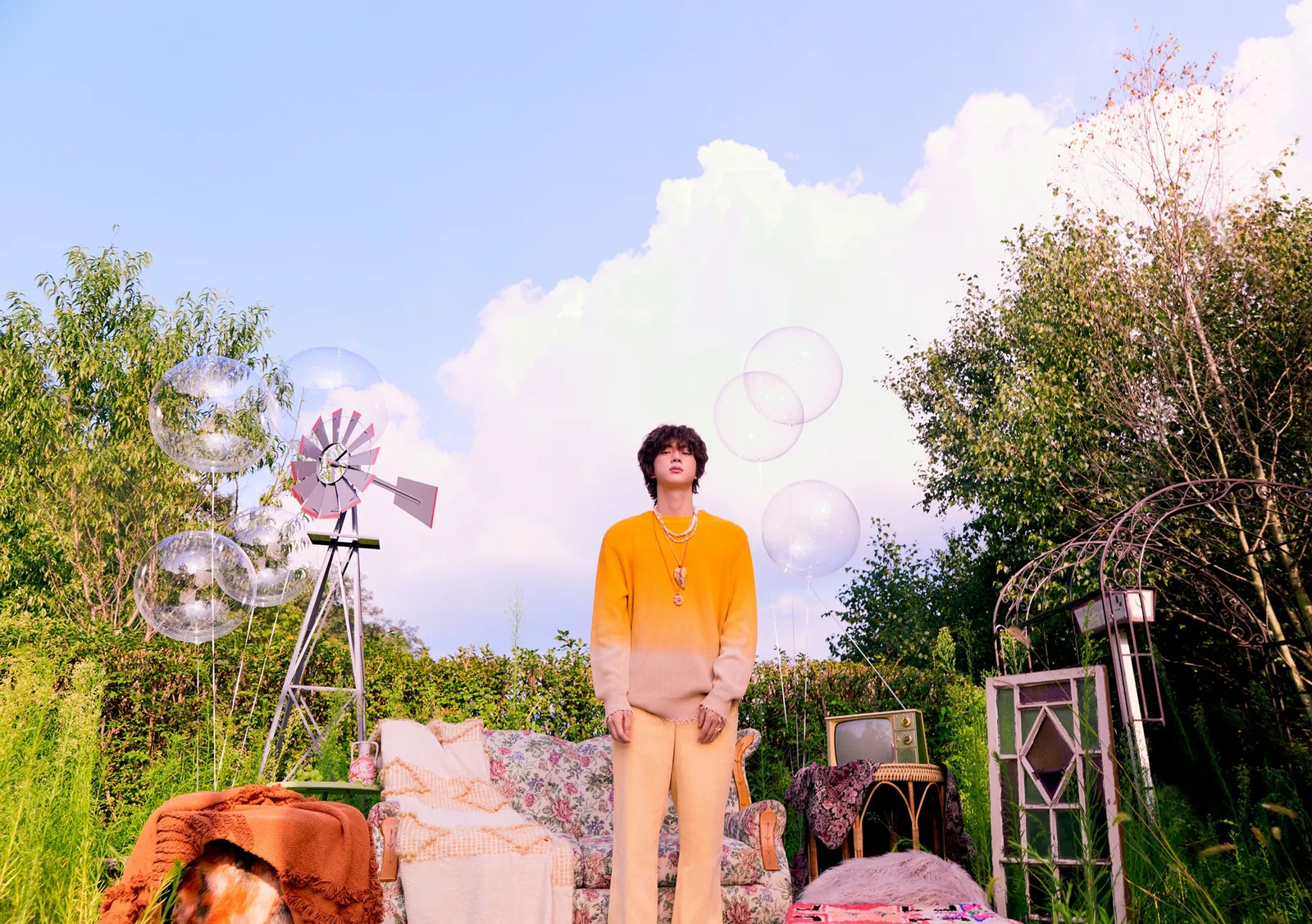Despite the fact that two years seem long, eternity is much longer.
BTS’ Jin is a white speck in a completely black universe in the “The Astronaut” logo clip. He passes meteors, the moon, and even a dog that looks a lot like his own as he drifts by. nothing can keep him. He is adrift and by himself. And suddenly a flash of violet light.
After making his solo debut nine years ago as a member of BTS, this clip sets the stage for Jin’s first song. The main character, an astronaut whose reality enlarges to encompass another, is him. He transforms into their fantasy, and they end up becoming his sole beacon of light that allows paradise to be seen. As a follow-up to “My Universe,” “The Astronaut” utilises the ever-expanding cosmos to describe an all-encompassing love. Both songs were co-written by Coldplay. Though they also blend in with the rest of Jin’s discography, as he has a tendency to do when exploring relationships that are dear to his heart, Jin has always been partial to themes of light and darkness.
Take “Tonight” (2019), Jin’s debut original song, which laments the loss of his family dog and sugar gliders. I’m afraid I won’t be able to see you once this night is over, and I’m afraid I’ll be left alone when this night is over. His second honest release on Soundcloud also carries this yearning. Jin holds his breath and dives into the deep, black sea of his inner self in “Abyss” (2020). Even if drowning is the only way he can communicate with himself, he wants to. Nevertheless, he lacks a voice and is left with no choice except to feverishly swim in circles while pursuing his shadow.
Oddly, even works that he did not contribute to have these motifs reappear. In front of the Post Office in Fall, a song by Yoon Dohyun from 2018, was performed by Jin. The song laments the transience of life as the day gives way to night. And in the song “Yours” for the Korean drama Jirisan (2022), Jin sings of getting lost in a growing night and looking for someone to talk to before daybreak. He asks himself, “Have I been stuck here?” before his gloomy worry transforms into something wistful. Every time you feel too far away, I tell myself to “keep waiting in this spot,” and every night I see you in my heart, but every time I do, I start crying.
One can’t help but stand out more in such a collection of music. When he sings solo on “Moon” from Map of the Soul: 7 (2020), he says, “Everyone says I’m gorgeous, but / my sea is in fact pitch-black / A star where flowers blossom and the sky’s deep blue: / the one that’s actually wonderful is you.” They still look out for him, he says, even when he’s depressed or hurt. He promises to reflect light back upon them as a result of orbiting them as the Moon around their Earth. Here, at last, is a partnership in which each partner still feels recognised, appreciated, and cherished. Only the ARMY, or BTS’s followers, could be the Earth.
It is therefore entirely understandable that the aimless and lonely astronaut would experience a dramatic change in luck after discovering the purple light. The colour gives away who the other is, and Jin has said that “The Astronaut” was also made with the ARMY in mind. Jin utilises the song to express precisely what kind of impact the ARMY has had on him as a gift to his fans before he departs to complete the required 18 months of military service.
He now has a sense of purpose thanks to the Army. Jin had resembled “that asteroid drifting by without a destination” a lot in the past. To enable them to “explore the universe” together, their kismet encounter made him into their fantasy. These are Jin’s favourite lyrics from a behind-the-scenes interview for the song. “I didn’t have a goal or a dream I wanted to fulfil,” he said, “but when I met our followers, the fans had things they wanted to see, and I eventually found something to pursue.” To explain the words, the music video creates a made-up narrative. It implies that Jin is an alien who has become stranded on Earth and who had been living a life of listlessness until she was drawn into it by a teenage neighbour.
He has been encouraged to express a variety of emotions by ARMY, second. Through his newfound friendship, Alien Jin has the ability to experience curiosity, fulfilment, and pride. Jin, the song’s protagonist, sings jubilantly, “and I adore you,” before adding, “when I’m with you, / there is no one else / I feel this way I’ve never felt.” in actuality Kim Seokjin has developed into a man who can handle the contrast of producing a lighthearted trot song about capturing a super tuna with songs about his deepest suffering. Since Jin likes to keep the tone light and considers himself essentially an entertainer, he has even asked that darker content be cut from performances. But he admitted in his letter for “Abyss,” as well as in later interviews, an increasing need to express his melancholy in music, if not in his daily life.
The third reason is that Jin now thinks he has a permanent home with ARMY because of their track record. “The Astronaut” opens, “You and me / A history that will never end / Oh, the story of “us” where you became my cosmos,” in contrast to prior songs that were drenched in melancholy since an end date was in sight. In full assurance of a prolonged future, Jin thus recounts their history. The song’s ecstatic refrain from BTS’s earlier collaboration with Coldplay, “My Universe” (2021), which goes, “And you, you are my universe / And you make my world light up inside,” similarly conveys the all-encompassing aspect of the connection.
When Jin decides to let his eagerly anticipated spaceship depart without him, the song’s dramatic turn comes. As his voice rises above the arid landscape to announce “heaven coming through,” we see flashbacks of interactions with his neighbour. Jin claiming that a person is the centre of the universe, or at least his entire universe, is the crucial point. someone who has helped him feel like he has a home, a purpose, and feelings.
As a celebrity, he truly expresses the song “And I love you” in everything he does. Because of their affection for him, it is a love that is freely offered and has grown. All of Jin’s songs about returned love exhibit this mutuality, with both individuals appreciating one another’s qualities and establishing a relationship on that basis. Jin may therefore remark, “If they’re loving it, I do, too,” even if he claims that he only performs things for the ARMY to appreciate them. One individual laughing by themselves is unusual, after all. Laughter is shared by all. Such a mutual interaction was what I was searching for.
BTS and ARMY are undoubtedly “embroiding this long night” (as the song “My Universe” puts it) together, pinning stars to their common night sky. With each unique experience of happiness, a dark canvas that Jin had before regarded as a hopeless expanse suddenly glitters. The lovely continuance of this sentiment in “The Astronaut” acknowledges how they have turned into one another’s heaven and home. Despite the fact that two years seem long, eternity is much longer.







